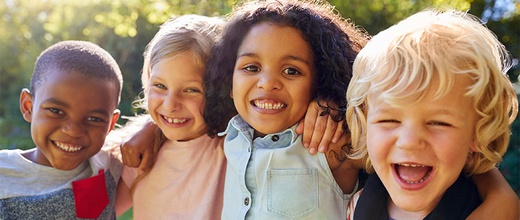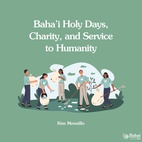The views expressed in our content reflect individual perspectives and do not represent the official views of the Baha'i Faith.
Today, more adults value inter-faith interaction, but we should encourage our children to interact with other religions, too.
In my volunteer work as a children’s class teacher, I bring together neighborhood children ages 7 to 11 to explore topics such as “learning to live in harmony”, “the importance of prayer”, and “how to be a good friend.” And in doing this every week, I’ve become aware of just how important it is for children to have conversations about the different religions they are raised in.
The neighborhood where my class takes place in is very diverse, and as a result there’s a beautiful variety in race, culture and religion in the class. Some are South Asian and practice Hinduism, another is African American and Pentecostal, and I have also had a Catholic Central American student. They come together each Sunday to sing, hear stories, and discuss how they can apply spiritual principles like love, unity, honesty and responsibility in their lives.
The inspiration for this class lies in the Baha’i teachings. Baha’u’llah, the Founder of the Baha’i Faith, said:
Bend your minds and wills to the education of the peoples and kindreds of the earth, that haply the dissensions that divide it may, through the power of the Most Great Name, be blotted out from its face, and all mankind become the upholders of one Order, and the inhabitants of one City. – Baha’u’llah, Gleanings from the Writings of Baha’u’llah, pp. 333-4.
This class is an effort to bring together kids from different backgrounds and create a new kind of community: one where everyone loves and understands each other, regardless of their differences. What better time to start the process of building love and understanding than in people’s formative years, when they have open minds and open hearts?
But in the past, some parents have worried about sending their children to a class organized by Baha’is, in which children from other religions participate. “Won’t my child get confused?” they ask. They fear that their son or daughter, out of constant exposure to different religions, will be influenced by other parents’ or religious orders’ teaching methods.
This concern is somewhat valid. It’s wise to be careful about who has a hand in establishing the foundation for the child’s set of moral values that will guide your child through life. But when parents learn more about the program, they learn that these classes don’t contradict what parents teach—rather, they help children see how those teachings can be applied to their daily lives.
Parents sometimes also feel that, if their child is already participating in a children’s program of their religion, then that child has no need for any further spiritual education. But there’s more to spiritual education than only learning religious laws and history: the children need a space to practice these values and see the concept of unity in diversity come to life around them.
For many who grew up in a religious bubble, without friends from other religions or an understanding of the diversity of customs and beliefs around the world, the diversity present in adult life can come as a shock. In these circumstances, it’s no surprise that there is so much fear of people who are different. If you’ve never spoken to someone from another religion, you will often believe anything you hear about that religion, even if it stems from incorrect—or even bigoted—opinions.
Abdu’l-Baha, the son of Baha’u’llah, noted the importance of exposing children to love and knowledge:
Every child is potentially the light of the world—and at the same time its darkness; wherefore must the question of education be accounted as of primary importance. From his infancy, the child must be nursed at the breast of God’s love, and nurtured in the embrace of His knowledge, that he may radiate light, grow in spirituality, be filled with wisdom and learning, and take on the characteristics of the angelic host. – Abdu’l-Baha, Selections from the Writings of Abdu’l-Baha, pp. 129–31.
Children’s classes are a perfect space to nurture a love for diversity, and help children practice spiritual concepts in their daily lives along with kids their age. What better way to combat the prejudice and loneliness in society than a class like this?
Many friends have wondered how I handle teaching kids who believe in many gods along with those who believe in a single God. But kids are way more open-minded than most adults: they understand that at its core, the concept of a Higher Power is the same across all religions—and while some people have elected to address the qualities of this Higher Power as separate entities, that doesn’t mean their beliefs go against more explicitly monotheistic religions. This difference that has literally torn countries apart has been a complete non-issue in the children’s class, and we freely talk about God and our spiritual lives together.
One day, we discussed how to stay thankful for what we have in our lives each day. I asked the children how they thank God every day.
Their responses were fascinating. One of the girls shared that her grandfather sets aside a dish of food at every meal “for God,” to be thankful for what they have. Another shared the practice of saying grace before a meal. Neither had heard of the other’s custom before, so they asked each other questions. The result was a very insightful conversation about different religious and cultural practices, based on a shared understanding of a spiritual concept… the sorts of conversations that build love and understanding between people, and that should happen more often among adults.
In every class, the kids ask each other questions: “How do you pray?” and “What kinds of things do you pray for?” “What kinds of holidays do you have?” And then they bond over their shared experiences, often without needing any prompting from me.
Because all of them, in the end, are going through the same moment in their lives: they’re trying hard to be better students, to defend themselves and others from bullying at school, to fulfill their responsibilities in the house, and to discover what they want to be when they grow up. And they have an advantage in all these areas: they understand that they aren’t alone, and that this world is a place where we can all learn from each other.
The primary, the most urgent requirement is the promotion of education. It is inconceivable that any nation should achieve prosperity and success unless this paramount, this fundamental concern is carried forward. – Abdu’l-Baha, The Secret of Divine Civilization, p. 109.

















Comments
Sign in or create an account
Continue with Facebookor